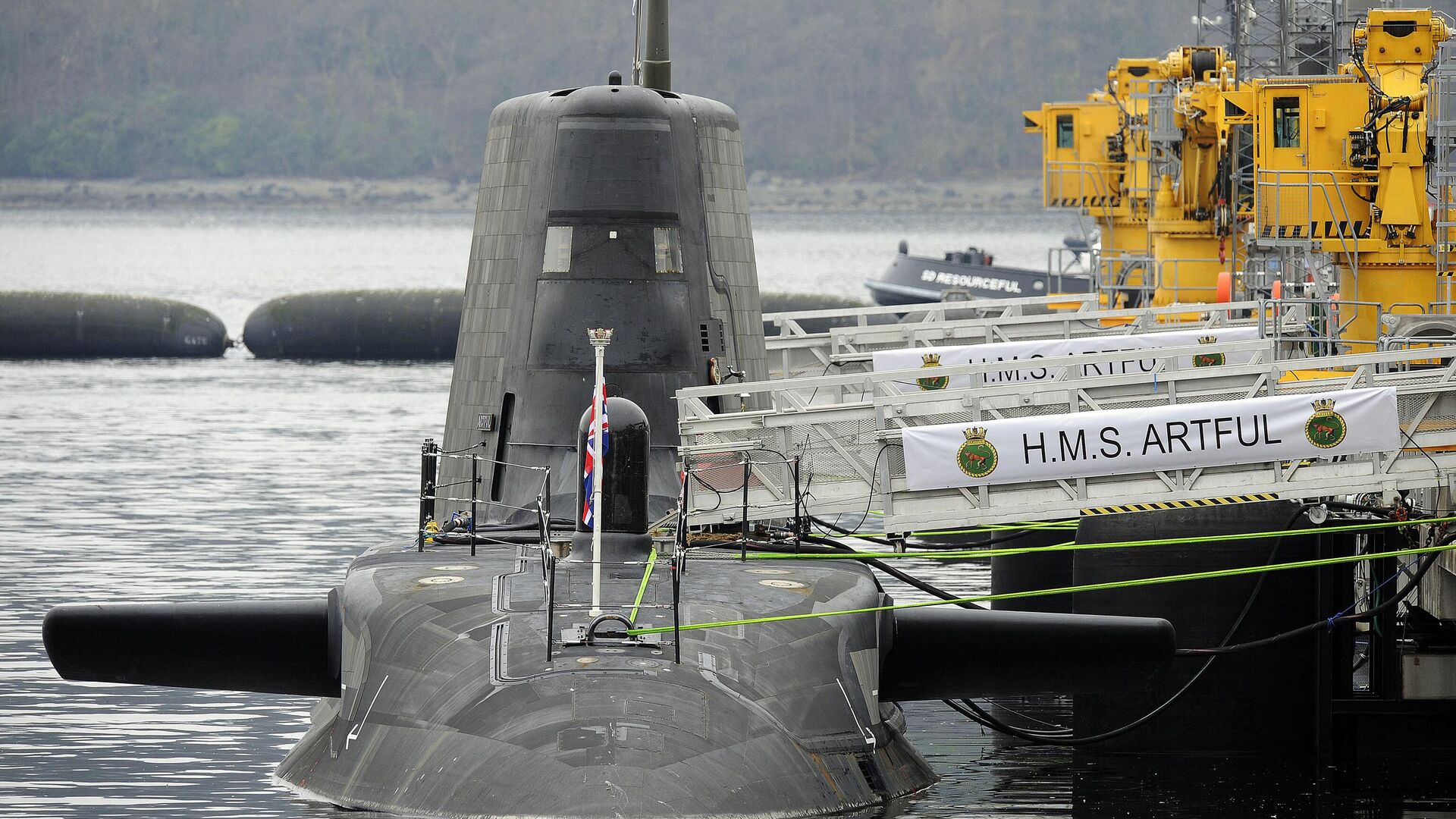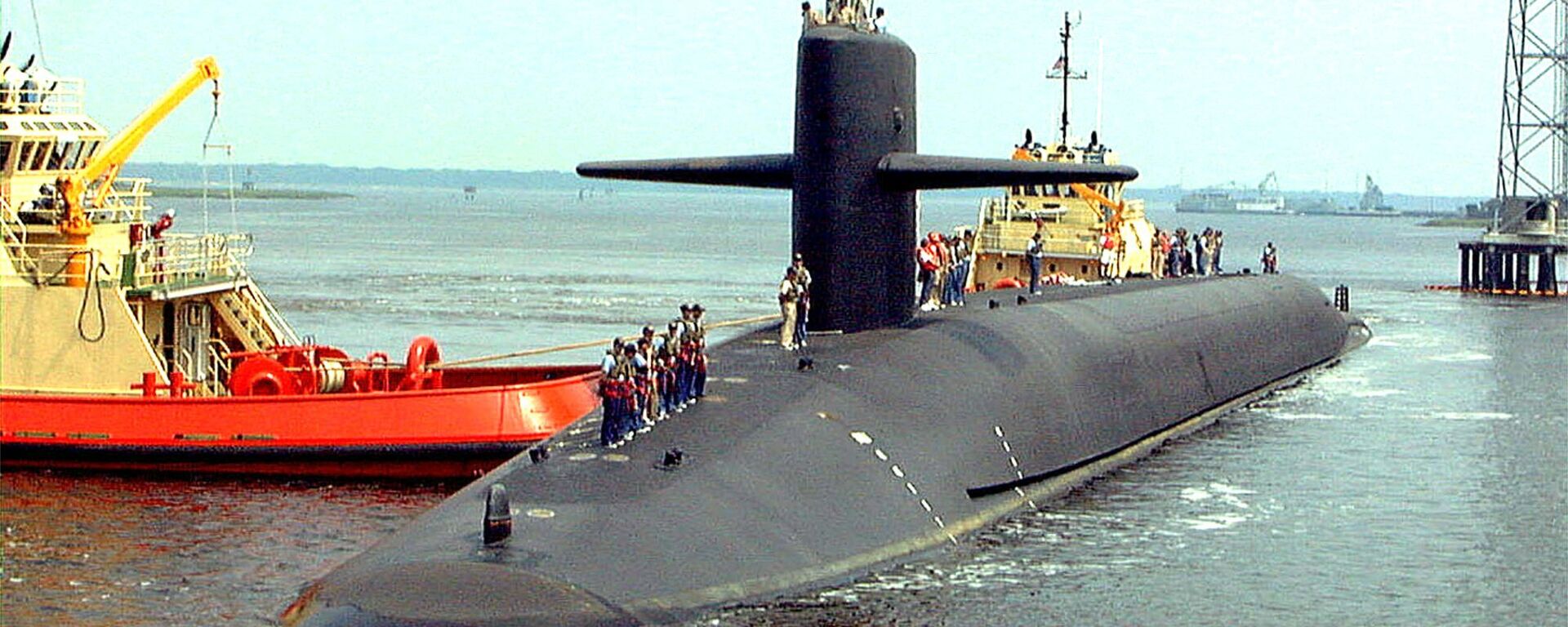https://sputnikglobe.com/20240327/uk-talks-big-on-nuclear-industry-but-lacks-capacity--ex-mep-1117583010.html
UK Talks Big on Nuclear Industry But 'Lacks Capacity' – ex-MEP
UK Talks Big on Nuclear Industry But 'Lacks Capacity' – ex-MEP
Sputnik International
Policy decisions of successive Conservative governments are “promoting the deindustrialization” of the UK, with “a Gadarene rush to globalization,” Nick Griffin, British political analyst and former MEP, told Sputnik.
2024-03-27T16:36+0000
2024-03-27T16:36+0000
2024-03-27T16:36+0000
rishi sunak
united kingdom (uk)
bae systems
edf
trident
nuclear submarines
analysis
https://cdn1.img.sputnikglobe.com/img/07e8/03/1b/1117582290_0:159:3077:1890_1920x0_80_0_0_6cdf5efb35439e0fc0ed7fac6fb759ea.jpg
Policy decisions of successive Conservative governments are “promoting the deindustrialization” of the UK, with “a Gadarene rush to globalization,” Nick Griffin, British political analyst and former MEP, told Sputnik.No wonder the UK “lacks the economic capacity to fight its way out of a paper bag, let alone confront foreign powers whose governments have worked to maintain and strengthen their industrial bases,” said the pundit.Griffin was commenting on the ‘next generation’ of British nuclear development recently announced by Prime Minister Rishi Sunak, aimed at securing the UK's nuclear deterrent and lower energy costs through nuclear power.Sunak announced a £200-million ($252m) package of investment into the future of the UK’s defense and civil nuclear industry on March 25.The “national endeavor” includes £20m ($25m) of taxpayer's money annually for the next decade to support the home of British nuclear submarine-building in Barrow-in-Furness, the port where the Royal Navy's new Astute-class fast attack subs are being built. Four Dreadnought-class ballistic missile submarines — HMS Dreadnought, HMS Valiant, HMS Warspite and HMS King George VI — are also being constructed by BAE Systems at the town's shipyard. Dreadnought-class submarines are designed to carry nuclear-armed Trident missiles.Sunak’s announcement also revealed that private cash injections to boost jobs and education would be forthcoming from industry leaders such as BAE Systems, EDF, Rolls-Royce and Babcock.But Griffin was Skeptical of the program's prospects.According to the analyst, it was only “belatedly” dawning on Westminster that “selling off key technologies and shopping strategic industries abroad has left the UK extraordinarily vulnerable at times of international crisis.”As Sunak unveiled the new public and private investment, he had stated that “Safeguarding the future of our nuclear deterrent and nuclear energy industry is a critical national endeavour."In a more dangerous and contested world, the UK’s continuous at-sea nuclear deterrent is more vital than ever. And nuclear delivers cheaper, cleaner homegrown energy for consumers,” the PM added. When politicians like the British PM promise ‘clean’ energy through nuclear materials, they are “hoodwinking the public in the most sly way possible,” a group of experts from the Global Humanitarian Crisis Prevention and Response Unit told Sputnik.“Promotion of nuclear energy by the international representation as ‘clean’ only makes sense “if you see that the reliance on nuclear energy is a gateway for development of Nuclear arms,” they argued.“Is any one individual on this planet to profess that for decades and centuries ahead there will be peace on earth and that no military targeting of nuclear facilities would take place? The answer is ‘No.’ So why do we even talk about energy dependence on the most hazardous materials on earth? It does not make sense,” the group pointed out.Over the past several decades, Britain consigned to the scrap heap several defense programs aimed at the development and upgrade of weapon systems. Conservatives were excoriated for mismanagement and placing emphasis on competition, rather than on resilience. A multi-billion pound program to buy light tanks for the army was plagued by "systemic and institutional" failures in the military procurement system, a review found last year. Before that, Britain’s Dreadnought nuclear submarines program — a replacement for the ageing Vanguard class Trident nuclear subs — was mired in years of delay since first approved in 2007. Numerous schemes either ran into overrun costs or were ditched altogether.Just recently, a Royal Navy test Trident II missile with a dummy warhead ended in disaster when the SLBM crashed into the sea next to the launching submarine after the missile’s first-stage boosters failed to ignite.Sunak’s announcement on Monday shows Downing Street is intent on following the same path with its latest initiative, fusing military and civil-related investment.The Global Humanitarian Crisis team noted the British army has been “continuously downsized over several decades… because the emphasis was continuously placed on ‘smarter ways and new ways of the Battle Art’ with the thought that Britain does not really require conventional armed forces.”But the progress of the currently-raging conflicts show they are "decided in a conventional manner and that nations require a conventional armed contingent – which can defend its borders when required. This realization is fast growing within Britain,” said the experts.A recent report issued by the Commons Defense Select Committee (CDSC) stated that the government “will never achieve war fighting or strategic readiness” without reforms to reverse a recruitment crisis and boost Britain’s stockpile of weapons and ammunition. Sunak's latest initiative does not address the issues raised in the report, although “the CDSC is right,” stressed the experts from the group.“There has to be a ground-up shift... it is a given that significant reforms and changes need to be made," stated the analysts.But if Downing Street wants to achieve that, it “will need to significantly raise the agenda as to why the UK needs to increase military spending. A crucial part of it would be convincing people. As matters stand, the British people do not want to be involved in war."
https://sputnikglobe.com/20240221/failed-trident-missile-launch-casts-doubt-on-us-and-uk-nuclear-capability-1116908317.html
https://sputnikglobe.com/20240326/russia-hits-out-at-hawkish-nuclear-policy-remark-by-uk-leaders-1117557144.html
united kingdom (uk)
Sputnik International
feedback@sputniknews.com
+74956456601
MIA „Rossiya Segodnya“
2024
News
en_EN
Sputnik International
feedback@sputniknews.com
+74956456601
MIA „Rossiya Segodnya“
Sputnik International
feedback@sputniknews.com
+74956456601
MIA „Rossiya Segodnya“
uk nuclear industry, next generation of uk nuclear development, nuclear industry investment announced by prime minister rishi sunak, what investments will be made into uk’s defense and civil nuclear industry, what is the state of the uk army,
uk nuclear industry, next generation of uk nuclear development, nuclear industry investment announced by prime minister rishi sunak, what investments will be made into uk’s defense and civil nuclear industry, what is the state of the uk army,
UK Talks Big on Nuclear Industry But 'Lacks Capacity' – ex-MEP
The British government unveiled a new program of funding for the nuclear industry's immediate needs on Monday, shortly after a recent Trident II ballistic missile test- launch by the Royal Navy ended in failure.
Policy decisions of successive Conservative governments are “promoting the deindustrialization” of the UK, with “a Gadarene rush to globalization,” Nick Griffin, British political analyst and former MEP, told Sputnik.
No wonder the UK “lacks the economic capacity to fight its way out of a paper bag, let alone confront foreign powers whose governments have worked to maintain and strengthen their industrial bases,” said the pundit.
Griffin was commenting on the ‘next generation’ of British nuclear development recently announced by Prime Minister Rishi Sunak, aimed at securing the UK's nuclear deterrent and lower energy costs through nuclear power.
Sunak
announced a £200-million ($252m) package of investment into the future of the UK’s defense and civil nuclear industry on March 25.
The “national endeavor” includes £20m ($25m) of taxpayer's money annually for the next decade to support the home of British nuclear submarine-building in Barrow-in-Furness, the port where the Royal Navy's new Astute-class fast attack subs are being built.
Four Dreadnought-class ballistic missile submarines — HMS Dreadnought, HMS Valiant, HMS Warspite and HMS King George VI — are also being constructed by BAE Systems at the town's shipyard. Dreadnought-class submarines are designed to carry nuclear-armed Trident missiles.
Sunak’s announcement also revealed that private cash injections to boost jobs and education would be forthcoming from industry leaders such as BAE Systems, EDF, Rolls-Royce and Babcock.
But Griffin was Skeptical of the program's prospects.
“They should have thought of all this before flogging off Britain's once cutting edge nuclear industry to France," he said. "What we see now is just another example of the Conservatives talking the talk, when they have neither the intention nor the ability to walk the walk.”
According to the analyst, it was only “belatedly” dawning on Westminster that “selling off key technologies and shopping strategic industries abroad has left the UK extraordinarily vulnerable at times of international crisis.”
As Sunak unveiled the new public and private investment, he had stated that “Safeguarding the future of our nuclear deterrent and nuclear energy industry is a critical national endeavour.
"In a more dangerous and contested world, the UK’s continuous at-sea nuclear deterrent is more vital than ever. And nuclear delivers cheaper, cleaner homegrown energy for consumers,” the PM added.
When politicians like the British PM promise ‘clean’ energy through nuclear materials, they are “hoodwinking the public in the most sly way possible,” a group of experts from the Global Humanitarian Crisis Prevention and Response Unit told Sputnik.
“Promotion of nuclear energy by the international representation as ‘clean’ only makes sense “if you see that the reliance on nuclear energy is a gateway for development of Nuclear arms,” they argued.
“Is any one individual on this planet to profess that for decades and centuries ahead there will be peace on earth and that no military targeting of nuclear facilities would take place? The answer is ‘No.’ So why do we even talk about energy dependence on the most hazardous materials on earth? It does not make sense,” the group pointed out.

21 February 2024, 17:58 GMT
Over the past several decades, Britain consigned to the scrap heap several defense programs aimed at the development and upgrade of weapon systems. Conservatives were excoriated for mismanagement and placing emphasis on competition, rather than on resilience.
A multi-billion pound program to buy light tanks for the army was plagued by "
systemic and institutional" failures in the military procurement system, a review
found last year. Before that, Britain’s Dreadnought nuclear submarines program — a replacement for the ageing Vanguard class Trident nuclear subs — was mired in years of delay since first approved in 2007. Numerous schemes either ran into overrun costs or were ditched altogether.
Just recently, a Royal Navy test Trident II missile with a dummy warhead
ended in disaster when the SLBM crashed into the sea next to the launching submarine after the missile’s first-stage boosters failed to ignite.
Sunak’s announcement on Monday shows Downing Street is intent on following the same path with its latest initiative, fusing military and civil-related investment.
The Global Humanitarian Crisis team noted the British army has been “continuously downsized over several decades… because the emphasis was continuously placed on ‘smarter ways and new ways of the Battle Art’ with the thought that Britain does not really require conventional armed forces.”
But the progress of the currently-raging conflicts show they are "decided in a conventional manner and that nations require a conventional armed contingent – which can defend its borders when required. This realization is fast growing within Britain,” said the experts.
“There is not enough investment in the Defense industry at the moment. If you compare it with what Britain invested in the 1940s, it was nearly 43 percent of its GDP. Today’s investments are not even 2 percent," added the group.
A recent report issued by the Commons Defense Select Committee (CDSC) stated that the government “will never achieve war fighting or strategic readiness” without reforms to reverse a recruitment crisis and boost Britain’s stockpile of weapons and ammunition. Sunak's latest initiative does not address the issues raised in the report, although “the CDSC is right,” stressed the experts from the group.
“There has to be a ground-up shift... it is a given that significant reforms and changes need to be made," stated the analysts.
But if Downing Street wants to achieve that, it “will need to significantly raise the agenda as to why the UK needs to increase military spending. A crucial part of it would be convincing people. As matters stand, the British people do not want to be involved in war."




